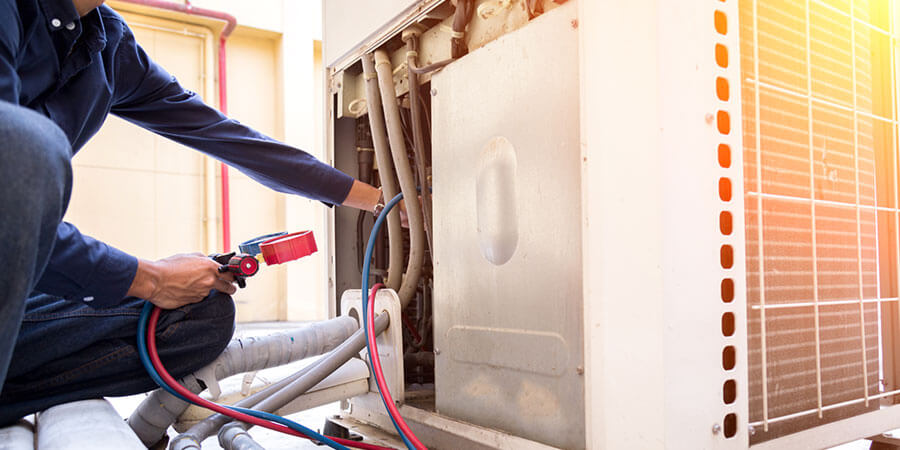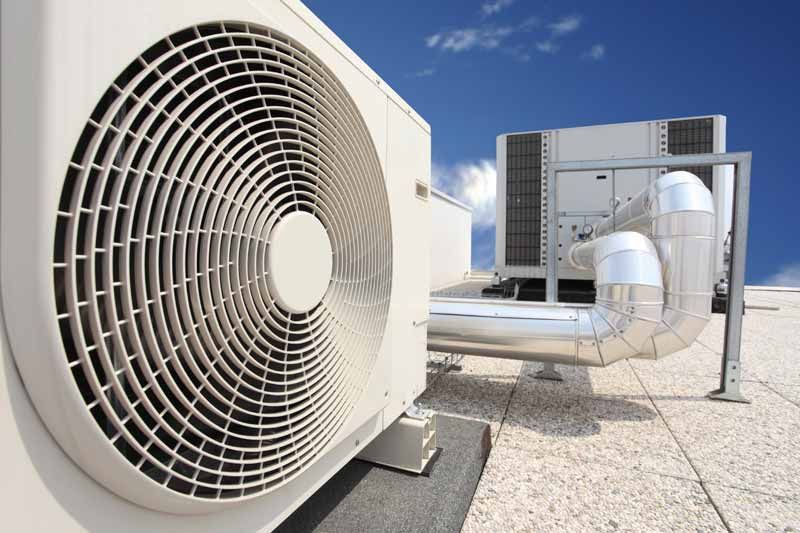Selecting Between a Warmth Pump and Furnace: Secret Considerations for Your HVAC Demands
When examining heating options for heating and cooling needs, the choice in between a heat pump and a heater can be complex. Each system provides unique benefits tailored to certain climates and energy performance goals. Understanding these distinctions is essential for making an informed selection. Trick aspects such as installment costs and environmental impact additionally make complex the selection process. Which choice really aligns with one's convenience and sustainability choices? The adhering to areas will explore these considerations in detail.
Recognizing Warmth Pumps: Just How They Work and Their Advantages
While many home owners think about different home heating options, understanding just how warmth pumps feature and their advantages can substantially affect their choice. Heatpump operate by transferring warmth as opposed to creating it. In the winter months, they extract warmth from the outdoors air or ground and move it inside your home, while in the summer, they reverse this procedure, cooling down the home by getting rid of warm outside. This dual functionality makes them functional for year-round climate control.One of the key advantages of heat pumps is their power performance. They make use of significantly less electricity compared to standard heating unit, possibly leading to reduced energy bills (heat pump installation ooltewah tn). Furthermore, warm pumps have a smaller carbon impact, making them an ecologically friendly choice. They likewise call for much less upkeep than traditional systems, adding to long-term cost financial savings. In general, comprehending the technicians and advantages of heatpump can assist home owners make informed decisions regarding their heating and cooling down demands
Discovering Heating Systems: Types, Operation, and Benefits
Heaters come in numerous types, including gas, electric, and oil models, each with distinct functional devices. Comprehending these distinctions is necessary, as they affect performance and heating performance. In addition, heating systems supply various advantages, such as consistent warmth outcome and dependability in colder climates.
Kinds of Heaters
Heating unit can differ significantly in style and procedure, with heaters being a preferred option amongst home owners. There are a number of sorts of heating systems, each utilizing different fuel sources and modern technologies. Gas furnaces are common, leveraging gas to create warm effectively. Electric furnaces, on the various other hand, use electrical resistance to create warmth, commonly favored for their uncomplicated installation. Oil heating systems, while much less usual, work in areas with limited gas accessibility (furnace replacement). In addition, condensing furnaces make the most of energy efficiency by reusing and recording exhaust gases. Each kind operates through a system of warm exchangers and ductwork to disperse cozy air throughout a home. Understanding the differences between these furnace kinds is vital for informed heating and cooling decisions
Advantages of Heating systems
For property owners looking for trustworthy heat during chilly months, the advantages of furnaces are significant. Furnaces give consistent heating, making sure even temperatures throughout the home. They are especially reliable in extreme cool, frequently outperforming warm pumps in cold conditions. Different kinds, consisting of gas, electrical, and oil heaters, offer adaptability to satisfy diverse requirements and preferences.Furnaces additionally often tend to have lower first setup prices compared to heatpump, making them a much more easily accessible choice for lots of. Their durable style adds to a longer life-span, with several systems lasting over 15 years with appropriate upkeep. Furthermore, contemporary furnaces are frequently equipped with sophisticated modern technology for improved performance, which can result in minimized power bills. Overall, furnaces stay a dependable selection for reliable home heating.

Energy Efficiency: Contrasting Warm Pumps and Furnaces
When comparing energy performance between heatpump and heaters, the Seasonal Energy Performance Ratio (SEER) plays an important function in figuring out efficiency. Furthermore, a functional cost evaluation discloses the long-term economic effects of each system. Comprehending these factors can lead home owners in making educated decisions regarding their home heating remedies.
Seasonal Energy Performance Ratio
Energy performance plays an important function in the decision-making procedure between heatpump and heaters, specifically when thinking about the Seasonal Power Performance Proportion (SEER) This metric measures the cooling performance of heatpump over a whole cooling period, giving a standardized way to examine efficiency. Higher SEER rankings show better power efficiency, translating to reduced power consumption and reduced utility bills. In contrast, heaters are typically examined utilizing the Yearly Gas Application Performance (AFUE) ranking, which shows home heating performance. When contrasting these 2 systems, home owners need to prioritize SEER ratings for heat pumps, as they straight influence overall power financial savings and ecological sustainability. An extensive understanding of SEER can significantly influence the long-term satisfaction and cost-effectiveness of the chosen heating and cooling option.
Functional Price Analysis
Recognizing the functional expenses related to heatpump and furnaces is vital for house owners assessing their choices. Heat pumps commonly supply greater energy performance, converting electrical energy right into warmth with marginal waste. This leads to reduced monthly energy bills, particularly in moderate environments. On the other hand, typical heaters, especially gas designs, might have lower in advance costs however can sustain higher functional expenditures with time due to fuel rates and effectiveness ratings.Moreover, warm pumps can function as both home heating and cooling systems, potentially decreasing the requirement for separate a/c devices. While preliminary investments for heatpump may be greater, their long-term savings in energy efficiency can make them an extra cost-efficient choice for lots of households. Careful evaluation of regional energy prices is important to identify the most effective option.
Installment Costs: What to Expect for each and every Heating Unit
Setup expenses for heater can vary considerably between heat pumps and furnaces, influencing house owners' decisions. Heatpump generally have greater ahead of time setup prices, usually varying from $3,500 to $8,000, depending upon the system dimension and intricacy of setup. This includes the exterior device, interior handling system, and necessary ductwork alterations. On the other hand, heaters have a tendency to have lower first costs, balancing between $2,500 and $6,000, which blog can be appealing for budget-conscious house owners. Installment expenditures can boost if comprehensive ductwork is required.Moreover, the selection of fuel type for heaters-- natural gas, gas, or electrical-- can likewise influence installment prices. While heatpump supply power efficiency, their first investment might prevent some buyers. Ultimately, examining installation expenses together with long-lasting cost savings and efficiency will certainly help homeowners in making educated choices about their heater.
Environment Factors To Consider: Which System Performs Much Better in Your Area
Exactly how do environment conditions affect the effectiveness of home heating systems? The efficiency of heat pumps and furnaces can differ significantly depending upon the local climate. In modest climates, warmth pumps succeed by efficiently moving warm from the outside air, making them an energy-saving option. However, their effectiveness decreases in extremely cool temperatures, where they might struggle to draw out enough heat. Conversely, heating systems, particularly gas versions, supply reputable and consistent warm no matter of outdoor conditions, making them better in colder regions.In locations that experience milder winter seasons, heatpump can operate successfully year-round, giving both heating & cooling. In contrast, areas with extreme wintertimes usually gain from the effectiveness of heating systems. Ultimately, recognizing the neighborhood environment is crucial when making a decision in between a heat pump and a heating system, as it straight affects their functional effectiveness and total performance.
Upkeep Needs: Long-Term Look After Warm Pumps vs. Furnaces
While both heatpump and heating systems require regular maintenance to assure peak efficiency, their certain requirements and care routines differ considerably. Heaters usually require less regular interest, with yearly evaluations sufficing to look for gas leakages, tidy filters, and examine general capability. Their simpler design usually permits for straightforward repairs.In comparison, heatpump demand semiannual upkeep due to their twin duty in heating and air conditioning. This consists of cleansing coils, inspecting refrigerant levels, and guaranteeing that both the exterior and indoor units work at their ideal. In addition, heatpump upkeep typically involves more complex components, making expert maintenance essential.Neglecting upkeep can result in lessened efficiency and raised energy expenses for both systems. Ultimately, home owners need to take into consideration these long-lasting care requirements when choosing between a heatpump and a furnace, as aggressive maintenance can extend the life-span and performance of either system substantially.
Environmental Impact: Selecting a Sustainable Heating Option
The ecological effect of heating systems is an important assessment for homeowners looking for lasting options. Heat pumps are usually extra energy-efficient than typical furnaces, as they transfer heat as opposed to generate it, considerably reducing carbon exhausts. By utilizing renewable resource resources, such as air-source or geothermal heat pumps, house owners can even more reduce their environmental footprint.On the various other hand, natural gas heaters discharge greenhouse gases and add to air contamination, though they typically give higher warm result. Innovations in modern technology have led to the growth of high-efficiency heaters that minimize emissions.Ultimately, picking a home heating system entails evaluating performance versus environmental influence. House owners are encouraged to review neighborhood energy resources and incentives for eco-friendly systems, ensuring an option that lines up with both personal comfort and ecological obligation. The choice influences not only prompt convenience but also lasting sustainability and environmental wellness.
Regularly Asked Inquiries
How Much Time Do Warmth Pumps and Furnaces Usually Last?
The life-span of heat pumps normally varies from 15 to two decades, while heating systems can last in between 15 to 30 years. Normal maintenance significantly influences their long life and performance in providing home heating options.
Can I Make Use Of a Heatpump in Incredibly Cold Climates?
Heatpump can operate in exceptionally chilly environments, however their efficiency diminishes as temperature levels decline. In such conditions, supplemental home heating sources why not find out more might be required to preserve comfortable interior temperatures and guarantee peak efficiency.

What Is the Sound Level of Warmth Pumps Versus Furnaces?
The sound degrees of heat pumps and furnaces vary significantly. Usually, warm pumps operate more silently than traditional furnaces, making them better for those delicate to sound, while heating systems may generate louder functional sounds throughout home heating cycles.
Are Warm Pumps Suitable for Both Heating and Cooling?
Heatpump are undoubtedly suitable for both heating & cooling (heat pump installation ooltewah tn). They function by moving warm, supplying reliable temperature control year-round, making them a flexible option for homeowners looking for an all-in-one cooling and heating option
What Dimension Home Heating System Do I Need for My Home?
Determining the appropriate size home heating system for a home needs reviewing elements such as square footage, insulation high quality, regional environment, and the home's design. Consulting a professional can ensure an exact analysis and ideal comfort. Warmth pumps typically use higher energy effectiveness, transforming electric power right into warm with very little waste. In moderate environments, warmth pumps succeed by successfully transferring warmth from the outdoors air, making them an energy-saving option. On the other hand, heating systems, particularly gas models, supply trusted and consistent warmth regardless of outdoor conditions, making them more effective in chillier regions.In locations that experience milder winter seasons, warm pumps can operate efficiently year-round, offering both home heating and cooling. Heat pumps are normally more energy-efficient than conventional heating systems, as they move heat instead than create it, considerably check it out decreasing carbon emissions. By using eco-friendly power resources, such as air-source or geothermal warmth pumps, homeowners can further minimize their eco-friendly footprint.On the other hand, natural gas furnaces emit greenhouse gases and add to air contamination, though they usually supply greater warmth output.